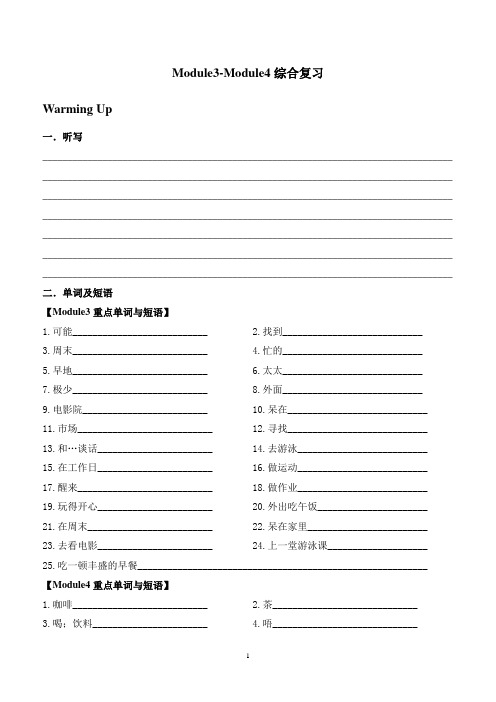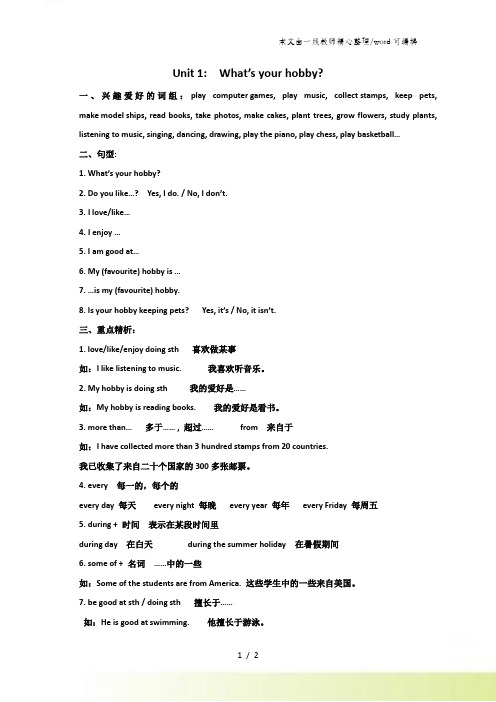广州版小学五年级英语上复习归纳
Module4-Module6复习(讲义)教科版(广州)英语五年级上册

五年级上册Module 46 复习Words: Food and drinks & weatherplate 盘子knife 小刀(右)fork 叉子(左)sandwich 三明治hamburger 汉堡包chips 薯条dumplings 饺子noodles 面条bread 面包pancakes 薄饼bun 馒头vegetable 蔬菜tomatoes 西红柿potatoes 土豆salad 沙拉fish 鱼meat 肉chicken 鸡肉duck 鸭肉steak 排骨dessert 甜点eggs 鸡蛋chocolate 巧克力sweets 糖果dimsum 点心ice cream 冰淇淋drink 饮料dry 干燥的wet 湿的hot 热的cool 凉爽的cold 冷的warm 暖和的cloudy 多云的rainy 下雨的windy 有风的sunny 晴朗的snowy 下雪的Phrases:a bowl of rice/soup 一碗米饭/汤 a bottle of j uice/coke 一瓶果汁/可乐a glass of water/milk 一杯水/牛奶 a cup of tea/coffee 一杯茶/咖啡Sentences :1. It smell s/taste s/look s good. 它闻起来/尝起来/看起来…2. What do you think of the food? 你觉得这食物怎么样?It’s very salty/hot/…3. Do you know that people in China have different taste s?4. Chinese people eat with chopsticks and bowls. 中国人吃饭用筷子和碗。
5. What’s the weather like in Beijing? = How’s the weather in Beijing? 北京天气怎样?It’s cold/hot/warm/cool/sunny/cloudy/windy/snowy/dry/wet.6. The temperature is/was only 15 ℃.气温只有15 摄氏度。
广州版小学五年级英语知识点总结教学内容

五年级上册知识点Module1 Routines and Dates学习重点1、掌握一月到十二月、四季的名称2、用英语说出日期日期的表示法有两种,如:“今天10月20日。
”先说月份:Today is October the twentieth (20th)先说日期:Today is the twentieth of October(20th)掌握节日的名称及日期。
(详见书本第13页)例如:New Year's Day( January 1st ) Women's Day( March 8th)4、能用英语说出学期的开始和结束The autumn term begins in September and ends in January.5. 掌握基数词和序数词,注意区分和运用重点掌握:first,second,third,fifth,ninth,twelfth,twentieth.基数词表示数量:three pandas三只熊猫。
序数词表示顺序:the second month第二个月6、注意表示时间频率的词:never、sometimes、often、usually、always,注意这些词在句子中的位置——除了“是”动词以外,他们都放在在动词的前面,如:(1)She often comes here . (2)She is always late .7、能用英语谈论日常的活动(能写一篇小作文)8、掌握时态:一般现在时的使用:(1)定义:一般现在时表示已形成习惯、规律的动作或状态。
(2)特征:通常句子中有often、usually、或sometimes等等。
(3)肯定句的结构:人称+动词:①其他人称(I、you、we、they、the boys……)+动词原形②第三人称单数(he、she、it、Tom、……)+动词“s/es”形式例句:The boys like TV plays. Sally likes TV plays.(4)一般疑问句:助动词(Do/Does)+人称+动词原形Do the boys like TV plays? Does the boy like TV plays?(5)否定句:人称+助动词否定形词(don’t/doesn’t)+动词原形The boys don’t like TV plays. The boy doesn’t like TV plays.(6)记住:助动词一出,后面动词用原形。
广州版小学英语五年级上册:Module3-Module4综合复习

Module3-Module4综合复习Warming Up一.听写______________________________________________________________________________________________________________________________________________________________________________________________________________________________________________________________________________________________________________________________________________________________________________________________________________________________________________________________________________________________________________________________________________________________________________________________二.单词及短语【Module3重点单词与短语】1.可能___________________________2.找到____________________________3.周末___________________________4.忙的____________________________5.早地___________________________6.太太____________________________7.极少___________________________ 8.外面____________________________9.电影院_________________________ 10.呆在____________________________ 11.市场___________________________ 12.寻找____________________________ 13.和…谈话_______________________ 14.去游泳__________________________15.在工作日_______________________ 16.做运动__________________________17.醒来___________________________ 18.做作业__________________________19.玩得开心_______________________ 20.外出吃午饭______________________21.在周末_________________________ 22.呆在家里________________________23.去看电影_______________________ 24.上一堂游泳课____________________25.吃一顿丰盛的早餐__________________________________________________________【Module4重点单词与短语】1.咖啡___________________________2.茶_____________________________3.喝;饮料_______________________4.唔_____________________________5.杯_____________________________6.牛奶___________________________7.某事;某物_____________________ 8.冷的___________________________9.热的;辣的_____________________ 10.可乐___________________________11.确信;肯定的___________________ 12.瓶子___________________________13.果汁___________________________ 14.玻璃杯_________________________15.罐_____________________________ 16.(两者)都_____________________17.应该___________________________ 18.米;饭_________________________19.饺子___________________________ 20.面条___________________________21.欣赏;喜欢_____________________ 22.面包___________________________23.三文治_________________________ 24.汉堡包_________________________25.炸薯条_________________________ 26.担心___________________________27.第一道菜_______________________ 28.西红柿_________________________29.蛋;鸡蛋_______________________ 30.汤_____________________________31.主要的_________________________ 32.主菜___________________________33.肉_____________________________ 34.蔬菜___________________________35.马铃薯_________________________ 36.甜品___________________________37.希望___________________________ 38.巧克___________________________39.开始;出发_____________________ 40.每一个人;所有人_______________41.一杯奶茶_______________________ 42.一些冷的东西___________________ 43.觉得很热_______________________ 44.四大杯可乐_____________________ 45.一杯咖啡_______________________ 46.五瓶果汁_______________________47.两玻璃杯水_____________________ 48.一盒牛奶_______________________49.三杯茶_________________________ 50.她的派对_______________________51.担心太多_______________________ 52.西红柿蛋花汤___________________53.好主意_________________________ 54.生日蛋糕_______________________三.课文内容【Module3重点句型】1.Ben在哪里?他在游泳池里。
五年级上英语期末单元复习Unit1 What’s your hobby?_广州版(一起)

Unit 1:What’s your hobby?一、兴趣爱好的词组:play computer games, play music, collect stamps, keep pets, make model ships, read books, take photos, make cakes, plant trees, grow flowers, study plants, listening to music, singing, dancing, drawing, play the piano, play chess, play basketball…二、句型:1. What’s your hobby?2. Do you like…? Yes, I do. / No, I don’t.3. I love/like…4. I enjoy …5. I am good at…6. My (favourite) hobby is …7. …is my (favourite) hobby.8. Is your hobby keeping pets? Yes, it’s / No, it isn’t.三、重点精析:1. love/like/enjoy doing sth 喜欢做某事如:I like listening to music. 我喜欢听音乐。
2. My hobby is doing sth 我的爱好是……如:My hobby is reading books. 我的爱好是看书。
3. more than… 多于…… , 超过…… from 来自于如:I have collected more than 3 hundred stamps from 20 countries.我已收集了来自二十个国家的300多张邮票。
4. every 每一的,每个的every day 每天every night 每晚every year 每年every Friday 每周五5. during + 时间表示在某段时间里during day 在白天during the summer holiday 在暑假期间6. some of + 名词……中的一些如:Some of the students are from America. 这些学生中的一些来自美国。
广州教科版五年级上册-unit 1复习

collect stamps
更多, 多于
more than
more than make model planes play music read books play computer games take photos keep animals watch TV make cakes collect stamps plant trees grow flowers
二 选择题 1 Jerry's hobby is __B__animals.(A draw B drawing) 2 My hobby is____B________.(A. sings B.singing) 3 ____B________stamps is my hobby.(A. Collect B.Collecting) 4 Do you __A__ stamps ? (A collect B collecting )
看书 种花 制作蛋糕 收集邮票 看电视 多于... 演奏音乐 饲养动物 种树 玩电脑游戏 拍照 制作模型飞机
看书
种花
制作蛋糕
收集邮票
看电视
多于...
演奏音乐
饲养动物
种树
玩电脑 游戏
拍照
制作模型 飞机
3 语音
pl, bl, cl, fl, gl 字母组合发音规律
letters
words
Try More
gl
glass
glove, gloss, glue
4 语法
1.—What's your hobby? —My hobby is playing music.
2.—What's his hobby? —His hobby is keeping animals.
五年级上册英语素材-复习3广州版

广州版五年级上册英语复习资料
语法:
1. 一般现在时(经常做)
标志词:usually, often, always, sometimes, never, every…
构成:a.主语为第一、二人称及复数时,动词就用原形;b. 主语为第三人称单数时,动词后加s或es.
变化规律:
a.直接在词尾加s; 如:play-plays, get-gets
b.以s, x, ch或o结尾的加es; 如:go-goes, do-does, watch-watches
c.以辅音字母+y结尾,把y改i再加es; 如:study-studies, fly-flies
2. 物品数量的表达
可数名词的表达:
单数:a / an +物品的单数; 如:a box, an egg
复数:①数词+名词复数;如:two boxes, two eggs
②数词+容器+of+名词复数;
如:一盒鸡蛋a box of eggs; (一盒鸡蛋不止一个)
两盒鸡蛋two boxes of eggs(容器和名词都要加s 或es)
不可数名词的表达:
单数:a +容器+of+不可数名词;如:一杯茶 a cup of tea(容器和名词都要用单数) 复数:数词+容器+of+不可数名词;如:两杯茶two cups of tea (只是容器加s或es)。
期末总复习(讲义)教科版(广州)英语五年级上册
(一)U12单词( )1. Are there any__________ over there?A. coffeeB. sandwichesC. tea( )2. The lady usually drink__________in one day.A. eight cups of water B .eight cup of water C. eight cups of waters( )3. Mike has__________apple. Janet has__________big orange.A. a; aB. an; aC. an;/( )4. They enjoy foods________bread, hamburgers and sandwiches.A. like B, for C.to( )5__________do you want to eat for dinner?I want some dumplings.A. WhereB. HowC. What( )6. Everyone__________the delicious soup.A.enjoyB. enjoying C enjoys( )7. Don’t worry. You worry__________.A. too muchB. too manyC. much too( )8. Jiamin doesn’t like coffee__________milk. He likes coke.A. ofB.inC.or( )9. Do you want more chicken?No, thanks. I__________ eat too much meat.A. am not B, doesn’t C.never( )10. What__________your father usually have__________ dinner?A. does, withB. do, forC. does, for( )11. What would you like to have for breakfast?I want two_______and a box_______.A. apple; of milkB. apples; of milkC. apples; milk( )12.How much are they?The coke is¥3.50. The coffee and the tea are¥5 each. That will be____________. A.¥8.50 B.¥13.50 C.¥12( )13. Is there____________at the weekend?A. anything interestingB. interesting anythingC. interesting something( )14. I think I want________have a cup________ milk________tea.A. of; of: withB. to: of: inC. to: of: with( )15.It's too hot.________I have a large cold cold coke?________.Here you are.A. Can: SureB. May; SorryC. Do;Sure根据中文意思写出所缺的单词。
五年级英语上册1-4单元知识点归纳与练习题新广州版
2014五年级英语上册 1-4 单元知识点归纳与练习题(新广州版)dule 1 HobbUnit 1 What 's your hobby?一、兴趣爱好的词组: play computer games, play music, collect staake modelad books, taake cakes,plagrow flowers, study plants, listening to muging, dancing, drawing, plaano, plalay basketball…二、句型:What ' s your hobby?2. Do you like …? Yes, I do. / No, Idon 'I love/like …I enjoy …(favourite)(favourite) hobbIs your hobbgpets?三、重点精析: love/like/enjoy某事女口: I like listening to music.他喜欢集邮。
2. My hobby is doing sth 我的爱好是…… 女口: My hobby is reading books.我的爱好是看书。
我爸爸的爱好是拍照。
hobby is ........ is my 's. / N 't. doing sth 喜欢做 我喜欢听音乐__________________________________ a…多于 ...超过…… from 来自于如:I have collectedan 3 hundred stamps fro0 cou 我已收集了来自二十个国家的300 多张邮票。
Jane 有九十多本英语书。
_________________________________ very 每一的,每个的every day 每天every night 每晚every year 每年every Friday 每周五during + 时间表示在某段时间里during day 在白天during the summer holiday 在暑假期间+名词……中的一些如:udents aAmerica. 这些学生中的一些来自美国。
广州最新版小学五年级英语上册1-12单元知识点归纳与习题(精品文档)_共13页
Module 1 HobbiesUnit 1 What’s your hobby?一、兴趣爱好的词组:play computer games, play music, collect stamps, keep pets, make model ships, read books, take photos, make cakes, plant trees, grow flowers, study plants, listening to music, singing, dancing, drawing, play the piano, play chess, play basketball…二、句型:1. What’s your hobby?2. Do you like…? Yes, I do. / No, I don’t.3. I love/like…4. I enjoy …5. My (favourite) hobby is …6. …is my (favourite) hobby.7. Is your hobby keeping pets? Yes, it’s. / No, it isn’t.三、重点精析:1. love/like/enjoy doing sth 喜欢做某事如:I like listening to music. 我喜欢听音乐。
他喜欢集邮。
_____________________________________2. My hobby is doing sth 我的爱好是……如:My hobby is reading books. 我的爱好是看书。
我爸爸的爱好是拍照。
___________________________________3. more than… 多于…… , 超过…… from 来自于如:I have collected more than 3 hundred stamps from 20 countries.我已收集了来自二十个国家的300多张邮票。
五年级上册英语素材复习2_广州版
广州版五年级上册英语复习资料句型:M1 Hobbies1. What’s your/his/her hobby?My/His/Her hobby is …(动词的ing形式). 2. Do you like…(动词的ing形式) ?Yes, I do. / No, I don’t.3. Does he/she…(动词原形)?Yes, he/she does.No, he/she doesn’t.M2 Abilities1. What can you/he/she do?I/ He/She can …(动词原形).2. Can you/he/she/it …(动词原形)?Yes, I /he/she/it can.No, I /he/she/it can’t.3. What can you do with your hands?I can write with my hands.M3 Daily life1. What do you usually do after school?I usually do my homework.2. What does he/she usually do after school?He / She usually does his/ her homework. 3. Does he/she…(动词原形)?Yes, he/she does.No, he/she doesn’t.M4 Foods and drinks1. Do you want coffee or tea?I want coffee. / I want tea.2. What do you want to drink for lunch?I want a cup of tea.3. Can I have a large coke?Sure./ Of course.M5 Foods we need1. What do you think of the food?It smells /tastes/looks good delicious/fresh2. What do you usually have for breakfast/ lunch/ dinner?I usually have…for breakfast/lunch/dinner.3. Chinese People eat with chopsticks and bowls.4. Western People eat with knife and fork.M6 Weather1. What’s the weather like?/How’s the weather?It is sunny/ cloudy/ rainy/ snowy/ windy /dry/ wet/ cold/ hot/ cool /warm.2. What’s the temperature?It is 15℃.。
- 1、下载文档前请自行甄别文档内容的完整性,平台不提供额外的编辑、内容补充、找答案等附加服务。
- 2、"仅部分预览"的文档,不可在线预览部分如存在完整性等问题,可反馈申请退款(可完整预览的文档不适用该条件!)。
- 3、如文档侵犯您的权益,请联系客服反馈,我们会尽快为您处理(人工客服工作时间:9:00-18:30)。
归纳 Module 1 词组: go to work l ing get up ng surf the Net go for a walk
ise
es
p
句型: ---How often do you play football? ---I play football every weekend. ---How are you? ---I’m fine, thank you.重点: 1. before, after e(在……之前) r. 晚餐前要洗 手 (在……之后) ’ l. 放 后我们 一起玩 2. 一般现在时 一般现在时 表示: 1. 经常发生的 动作或存在 状态,常和 ays(总是), us ly(通常), (经常), imes(有时候), day(每天), week(每周)等时间状 连用。 2.表示普遍真 理 一、陈述句: 肯定句:《主 +be动词~》 1. er. 我是老师 2 er 1st 我的生日在 十月一日 《主 +动词~》 ys. 我经常在周 日踢足球。 r. 她喜欢夏天 否定句:1,主 +be动词+not~ nt. 你不是 生 2,主 +do not +动词~ ’ day. 我每天不去 ’ days. 她在周六不 购物。 二、一般疑问句 (句型、用法) 陈述句变一 般疑问句时 , 1. 把be动词 移到主 前 面,即《Be动词+主 ~》 如 ------ nt? ------Yes, I am. 2. 把do或 oes移到 句首,即《Do (Does)+主 +动词原型~》 如:------ ys? ------ N , ’ ------ Do day? ------ Yes, he does. (练 ,按要求做题 ) er. (变成否定句 ) nt. (变成一般疑 问句) ay. (变成一般疑 问句) 掌握 1. 、月 、 日的单词 2. 序数词 3. 日 表 法
spring 春天 summer 夏天 autumn 秋天 winter 冬天 月 一月: ry 二月: ary 三月: 四月: 月:May 六月:June 七月:July 八月: t. 九月: mber 十月: er 十一月:N ber 十二月: ber序数词 (第1) d(第2) (第3) h (第4) (第5) (第6) th(第7) h(第8) (第9) (第10) nth(第11) th(第12) (第13) (第14) enth(第15) enth(第16) h(第17) (第18) (第19) ieth(第20)
重点: at, on, in 的用法和区 别 at: (用于表示时 刻、时间的某一 点) ( ’ ) 在九点 at 6:30 on: (用于表示具 体的某一天 ,具体某天的 午或下午 ) y 在周一 ng 在周二的早 on June 6th 在六月六号 nd 在周末 in: (用于月、 、 ,泛指的 午 或下午) in May in July r in 1996 in 2008 in ng noon (练 ,填入合适的 介词) 1. I go to bed 9:30. 10:00 ys. ’ mber. day is ber 12th.
日 New Year’s Day 元旦 Women’s Day 妇女 May Day 劳动 Children’s Day 儿童 Army Day 建军 Teacher ’ Day 教师 National Day 国庆
Module 2 1. Can 表示能力:“能,会,可以”它没有人称 和数的变化 ,它后面必须 跟动词原型 。 can (能、会) = ’ (不能、不会) 如: can fly. The cats ca ’ an ’ 2. very well, well, quite well, not very well, not at all 如:The lady can play tennis very well. The man can play football well. They can speak Japanese quite well. The girl can’t skate at all. Module 3 单词(植物名称) banyan 榕树 pine tree 松树 kapok 木棉 rose 玫瑰 lily 百合花 tulip 郁金香 sunflower 向日葵 bulebell 风铃草 violet 紫罗兰 词组: of course take photos take a rest line up pick flowers climb trees sit on the grass listen to the radio ride a bike take a walk take good care of city flower
重点: 1. can , mustn’t 不 You can ride a bike. You can walk dogs here. You mustn’t pick the flowers. You mustn’t walk on the grass. 2. 现在 时 现在 时 表示现在正 在 的动 作。时间标志:now, listen, look 一、陈述句结构 : 《 主 + be动词+现在分词~》(现在分词是 :动词+ing) 如: ing TV now. 我正在看电 视。 . 我们正在下 棋。 二、否定句和疑 问句 (句型、用法) 否定句:《主 +be not +现在分词~》 如: s. 我没有摘树 叶。 ’ t. 她没有在写 报告。 疑问句:《Be动词+主 +现在分词~》 如: res? 你(们)正在照相吗 ? s? 他正在收集 树叶吗? 三、特殊疑问句 (句型、用法) 结构:《特殊疑问词 +be动词+主 +现在分词~》 如: ? 你(们)正在干什么 ? 2. What is John d ? 约翰正在干 什么?
动词的现在 分词构成: 构 成 法 例 词 一般加-ing (以y结尾也 直接加 g ---- ng ---- g 以e结尾的 词去e后加 -ing ---- ng ---- g ---- g 以重读闭音 或r音 结尾,末尾只有一 个辅音字母 的词,要双写这个 辅音字母,再加-ing ---- ng --- ing
以ie为结 尾的重读开 音 的词,改ie为 ,再加-ing ----
一般现在时 现在 时练 单选 s tal. A. work/ work ’ ts ____. ing ing 填空 1. Tom ( day. 2. (come) back from work very late. 3. ( room. ( . 4. ( ese? ( day? 6. Look! Mary is ( r.
Module 4 词组: leave for on foot a day trip shopping centre
句型: ----How can we get to …?/ How are you going to get there? ----By plane/ train/ bus/ car/ bike/ underground/ ship.(On foot) 时间表 式: 7:00 seven o’clock 12:05 five past twelve 6:15 a quarter past six 8:40 twenty to nine 2:30 half past two 一般 时 一.意义: 表示 某个时间要发生的动作,常 表示 的时间状 连用。如: , , y , next year , next , , ng …… 二. 构成 变化 一般 时常用的 结构 to+动词原形 : 表示 、 做的 或即 发生或肯定要发生的 。 /will+动词原形 : 表示 要发生的动作或 ,没有 的计划性, 用 表示意愿 to +动词原形 1.肯定句 主 ( , , to +动词原形+其它成 r sh next year. 我 。 2.否定句 主 +be(am / is / are) to +动词原形 +其它成 to(go to) ht. 我 天晚 不 去看电影。 3.一般疑问句 Be (am / is / are)+主 to+动词原型+其它成 …? to pla ?N , ’ 你 和你去 球吗?不。 4.特殊疑问句 特殊疑问词(Wh-)+一般疑问句 ? al.? 春 你 在哪过?
+动词原形 (在 面 ,主 是第一人称时,常用shall) 1.肯定句 主 +动词原形+其它成 ( to him next week. 下周我 他写信。 2.否定句 主 + not + 动词原形 +其它成 ’ ng. 天晚 他们不看电视。 3.一般疑问句 +主 +动词原形+其它成 row ? 天你和我们 在 好吗? 4.特殊疑问句 特殊疑问词(Wh-) +一般疑问句 When will r be back? 你 什么时侯回 ?
e 5 单词 动物: , , , , , , , , , , y 大洲:Africa, Europe, Asia, North America, South America, the Antarctic 词组: Why not? Who knows? 句型: ----Where is … from? ----It’s from …. 祈使句 (表示请求、命令、建议、禁止等,用动词原型) Come here. Don’t forget. Don’t be late. Module 6 Directions 单词:场所:hotel, train station, police station, bookshop, restaurant, post office, bank, market, cinema, hospital, gym, lab
